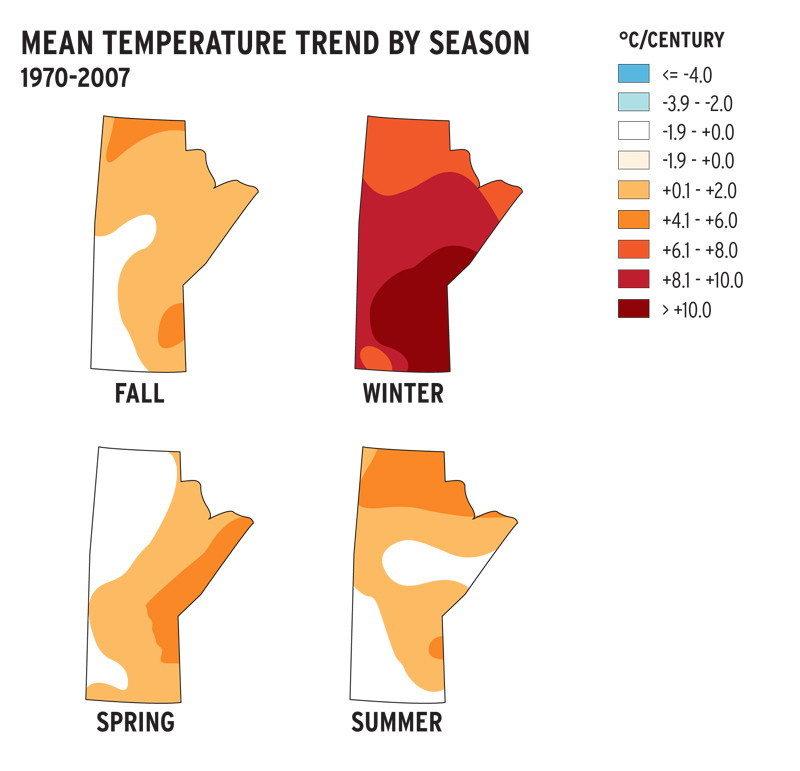Climate change forces Manitoba industries to create alternative initiatives
Experts contemplate the future of health, Hydro, agriculture and forestry in Manitoba
This summer, Manitoba’s government will confront the consequences of climate change head on with the implementation of the Heat Alert Response System (HARS), which is intended to lessen the impacts of climate change on the health of Manitobans.
With the creation of a targeted program like HARS, environmental experts contend that industries like Manitoba Hydro, as well as Manitoba’s agriculture, forestry and health care, will need to respond to more intense climates with their own climate adaption initiatives.
Thus far, provincial campaigns to lessen the impacts of climate change have been focused on greenhouse gas reduction.
Despite these efforts, climate change is still in full effect and continues to worsen.
Jerry Delorme, director of disaster management at Manitoba Health, says modern climate projections show that instances of drought in Manitoba will double in the next 10 to 20 years.
In response to these predictions, HARS, formed through a partnership between Manitoba Health and Health Canada, plans to educate the public on how to better react to extreme heat.
Delorme says that though Health Canada will eventually implement HARS across the nation, Manitoba will be among the first provinces to pilot the project.
“We were targeted because of climate projections,” said Delorme. “Along with Toronto and London, Winnipeg’s ecosystem is among the top three that will change the most in the next 100 years.”
Indeed, Gwynne Dyer, internationally renowned journalist and author of 2008’s Climate Wars, says that Manitoba is in serious danger.
“If you look at the 50-year horizon, the latest reliable numbers from the Hadley Center (for Climate Change Prediction and Research) show that global temperatures are four degrees higher,” said Dyer. “For inland areas, that transfers to a lot more energy. Temperatures will go up in Manitoba by seven degrees.”
Delorme says HARS is as much a response to changing population demographics as it is to climate change.
“Baby boomers are getting older and elderly people ... get affected during heat waves,” he said. “We know from past events that extreme heat means morbidity and mortality.”
Dyer agrees.
“Lots of people die when it gets that hot,” he noted.
Potential droughts impact Hydro’s ability to export
Curt Hall, project manager of Manitoba’s Climate Change Connection, an organization dedicated to informing Manitobans about issues related to climate change, says Manitoba Hydro should also consider climate adaptation strategies.
“We think of Hydro as being an infinite and unassailable resource,” said Hall. “Our hydro is dependent on water from our river systems, though. As we are having changes in precipitation, we are having changes in our ability to produce power.”
Hall states that 90 per cent of Manitoba’s power comes from dams situated on the Nelson River. The amount of power drawn from a Hydro dam turbine is proportional to the amount of water in a dam’s reservoir.
Thus, as a reservoir’s level drops due to drought, the amount of potential energy decreases.
However, rainfall also influences the way dams produce energy. Dyer, though, admits the difficulty of predicting precipitation.
“Overall, on a warmer planet, you have more rainfall, but you also have high evaporation,” he said. “It is hard to determine where it will fall and whether it will soak in.”
Dyer asserts that we can predict the rate at which water might be absorbed – just not the rate of precipitation.
“There is a number here to claim to,” he said. “If the ground temperature is over 24 degrees, you are unlikely to see rain soak in.”
Hall adds that during past periods of drought, Hydro has lost its ability to export power.
“Manitobans think of themselves as perpetual exporters (of energy),” he said. “If we have a drought though, we are no longer exporters.”
Glen Schneider of Manitoba Hydro’s public affairs division says Hydro is considering means of adaptation.
“If there is less water, that means we would have to advance to other sites for development or look for other sources of energy,” he said. “We might decide to develop further up north if this happens.”
Schneider also admits concerns about Hydro’s future ability to export.
“If conditions turn to drought – which there is mixed forecast on – we would have less production from Hydro plants,” he said. “This would certainly affect our ability to export.”
Agriculture and forestry
According to Dyer, Manitoba’s forest industry is also threatened.
“Fires will spread more readily and the ground will be drier,” he said. “You are looking at double or triple the number of fires.”
Dyer adds that a warmer climate will allow pine bark beetles to survive through the winter, potentially decimating our trees in the summer.
Hull says agriculture faces similar problems.
“What I’ve heard is that we are looking at growing new varieties of crops,” he said. “We are trying to figure out what those might be.”
Though many predictions of how climate change might affect Manitoba are still speculative, Hull purports the importance of considering these issues.
“We have to consider these things,” he said. “They need to be studied and investigated so we can develop systems, make plans, change infrastructure.”
However, Dyer remains skeptical.
“Manitoba depends on rainfall,” he said. “There is not a hell of a lot you can do about that.”
Published in Volume 65, Number 24 of The Uniter (March 24, 2011)







